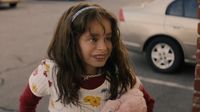In a striking turn of narrative, Episode 5 of Hulu's Good American Family challenges viewers to rethink their perceptions of the Natalia Grace case, presenting a poignant glimpse into the life of the young girl at the center of the controversy. This episode, titled "Too Hurty Without It," marks a significant tonal shift, as it transitions from the Barnetts' perspective to that of Natalia, portrayed by Imogen Faith Reid.
Initially, the series focused on Kristine and Michael Barnett, who adopted Natalia, a child with dwarfism, in 2010. Their claims that Natalia was an adult masquerading as a child and their subsequent abandonment of her have captured public attention and sparked widespread debate. However, Episode 5 peels back the layers of this narrative, revealing Natalia's side of the story and the profound impact of her abandonment.
According to creator Katie Robbins, "What happened to Natalia would not have happened had she not had dwarfism, had she not had a disability, and had people not made assumptions based on growth patterns in people of average stature." This critical observation sets the stage for a deeper exploration of societal biases against individuals with disabilities.
The first four episodes of Good American Family were steeped in melodrama, portraying Natalia as a villainous figure through the lens of the Barnetts. However, in Episode 5, viewers are thrust into Natalia's reality, where she grapples with the harshness of being abandoned and left to fend for herself. This episode showcases her struggles to manage daily tasks, such as washing her hair with dish soap because she cannot operate the faucet.
As Natalia navigates her new life alone, the audience witnesses her vulnerability and desperation. The episode highlights moments of innocence, such as when she speaks to a can of peaches, illustrating her longing for connection and love. Robbins emphasizes that this shift in perspective was intentional, stating, "Seeing the world through her eyes makes us re-think everything that we’ve seen in those first four episodes and assumptions that we’ve made." This narrative choice invites viewers to confront their biases and reconsider the complexities of Natalia's situation.
In a particularly harrowing scene, Natalia is shown abandoned without her walker, struggling to chase after the Barnetts' van. This moment starkly contrasts the previous portrayal of her as a manipulative figure. Instead, viewers see a child in distress, underscoring the impact of the Barnetts' actions on her well-being. The cinematography effectively conveys her physical limitations, with the camera capturing her attempts to reach for food and navigate her surroundings.
As the episode progresses, Natalia's interactions with her adoptive parents reveal a painful dynamic. During a visit, Michael Barnett dismisses her pleas for help, showcasing the emotional distance between them. In a later scene, Kristine appears on a talk show, claiming, "Natalia, I would never give up on you," a statement that rings hollow to Natalia as she watches from her apartment. This juxtaposition of words and actions highlights the emotional turmoil Natalia experiences as she grapples with her identity and the rejection she faces.
Robbins articulates the importance of portraying Natalia's truth authentically, stating, "Natalia was just misunderstood. She was just a child who had a lot of trauma." This sentiment resonates throughout the episode, as viewers witness Natalia's attempts to navigate a world that has largely turned its back on her.
Imogen Faith Reid's performance has been widely praised for its depth and emotional resonance. Robbins notes that even seasoned crew members were moved to tears by Reid's portrayal, emphasizing the significance of telling this story with sensitivity and care. The episode serves as a reminder of the complexities of human relationships and the lasting scars that trauma can leave on individuals.
As the series continues to unfold, it sets up new mysteries surrounding Natalia's past and the Barnetts' motivations. Robbins hints at further revelations, stating, "If Natalia is a child, how did everything happen? How were they able to get her re-aged?" These questions deepen the intrigue of the narrative, encouraging viewers to engage critically with the unfolding story.
In conclusion, Episode 5 of Good American Family serves as a powerful examination of bias, trauma, and the intricacies of human relationships. By shifting the narrative focus to Natalia, the series not only humanizes her experience but also challenges audiences to reflect on their perceptions of disability and the stories we choose to believe. As the show progresses, it promises to unravel more layers of this complex tale, inviting viewers to confront their own biases and assumptions.









